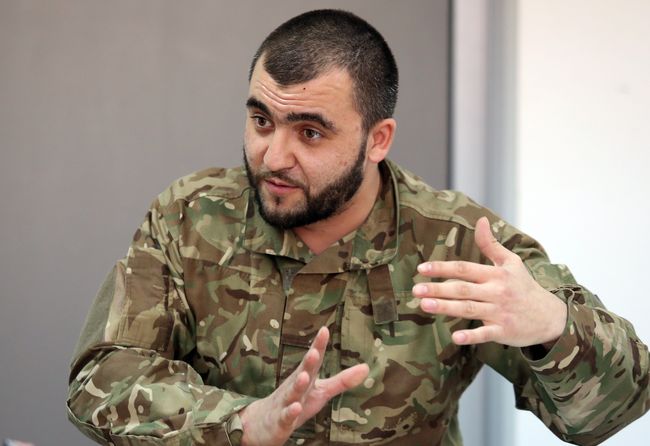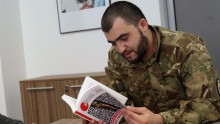Oleksandr Kanibor, soldier of the special operations regiment Azov, looked up Den’s office the other day. According to him, Den sets an example of not only covering the current developments, but also seeing historical cause-and-effect relationships. Moreover, Kanibor is a teacher who volunteered to go to war right after Maidan. He is well acquainted not only with our newspaper, but also with the books from our publications, so Den’s presents – the triptych of Ukraine’s present-day history (“The Trap”; I, an Eyewitness; and Catastrophe and Triumph) and the tome Return to Tsarhorod – became a pleasant surprise for him. But most importantly, Kanibor has subscribed to the Ukrainian and English versions of our newspaper for the regiment Azov and bought all the books from Den’s Library for himself and his comrades in arms. He believes it necessary to present information to the troops in that very patriotic and analytical manner in which Den/The Day does it.
“IN 2014 IN KRYVY RIH WE WERE ABLE TO ORGANIZE COUNTERACTION TO PRO-RUSSIAN PROVOCATEURS IN A MATTER OF MINUTES”
Your home city, Kryvy Rih, is situated in that region of Ukraine, which proved resistant to Russian aggression. Today, doing your duty in Donbas (and in Mariupol in particular), do you realize how real was the threat of losing a bigger piece of our eastern territories?
“Around the Easter of 2014 thousands of Ukrainian patriots gathered in Kryvy Rih. It is they that actively fought off the attempts to seize the city hall by pro-Russian bandits and mercenaries. There was information about armed ‘visitors’ who were staying in the city. But the local people would not stomach the imported provocateurs. The townspeople showed the authorities that there is no way for separatism to gain a footing in Kryvy Rih. After the ‘Russian Spring’ flopped, a lot of patriots, me including, joined the voluntary battalions. I went to Kyiv to join Battalion Azov.

“As to the events in Donbas, our hearts bled for it. When the first major events took place, we were very skeptical about the numbers of patriots in Luhansk oblast, who stood up to the oncoming terror. They were too few, and it was too hard for them. How could we help? A resistance front was taking shape. Unfortunately, in the spring of 2014 Donbas was exposed, indeed. In Kryvy Rih we were able to rally people to a protest action in a matter of minutes. But at the same time, the authorities would never let us act as our enemies did. They could stab with knives, but we were told to abstain from physical violence and provocations. I remember this phrase, ‘No provocations please,’ since 2012, when the so-called Kivalov-Kolesnichenko law was passed. The war proved that when you get shot at, you must not hesitate to respond. You have to respond immediately, otherwise it means a risk of getting killed. This is the main principle. We need to realize that war plays by its own cruel rules. If we do not follow them, we are doomed to lose. Those keep silent who count days till demobilization. This is the policy of passive retreat. There are men today who are capable of rebuffing the enemy, but they are withdrawn to the third echelon of defense. I can say that Azov never kept silent, nowhere. Maybe that is why we have fewer casualties, because offensive guarantees lesser losses.”
“THE CONFLICT IN DONBAS IS NOT BASED ON ETHNICITY. IT IS A CONFLICT OF WORLD OUTLOOKS”
Russia makes use of the so-called “Russian World.” Meanwhile, lots of ethnic Russians are fighting for Ukraine’s cause, against Russia’s aggression. So, who fights who in this war?
“There are very many Russians in my battalion. They are the people who understand where the root of all evil is. They are not buying Russian propaganda, they do not flinch before the mortal danger in battle. So, this is not an ethnic conflict, but a conflict of world outlooks. A man of character, fighting for his freedom, versus an aggressor bragging about his missiles. The latter is a real embodiment of a walking inferiority complex. And this is dangerous, for that is what makes a maniac. Unfortunately, those Russian guys who have honestly fought for Ukraine, hardly have a chance to obtain Ukrainian nationality. And what awaits them at home, is all too well-known. In other words, these people were effectively sold down the river. Beg pardon, but Saakashvili was granted the Ukrainian nationality, just like a number of other foreign nationals. For what merits, may I ask? As an advance payment? Why, then, those are denied who shed their blood to prove their devotion to Ukraine? What are we to make of it? And a separate issue: appointments to positions of power. As it turned out, Ukrainians cannot be appointed to such posts. Does it mean that we are crippled, dumb, or inexperienced? This is a strange policy, which the public does not understand.”
“WE WERE NOT NAIVE AND KNEW HOW REVOLUTIONS TEND TO END. BUT WE HAD NO OTHER CHOICE”
Remembering the Maidan events, don’t you get a feeling that the people are not the winners, but those who stood on the stage are?
“Even back then we knew that the stage of Maidan is not Maidan. Certain objective historic processes took place, in which we had to prove our worth. This does not mean that everyone had a blind faith in the slogans chanted by a handful of individuals. Our intentions and aspirations are to work. Believe me, it was not so easy to just go and kick those windbags out. But I emphasize that Maidan had no leaders. No one staked on some or another ‘idol.’ Indeed, in 2004 the people united around the name of Yushchenko, but this time around everything was different. This is another stage in the evolution of national consciousness. In 2014, we joined forces exclusively around values.”

Do you feel bitterly disappointed about those events?
“It would be wrong to think that we were naive and did not know how revolutions tend to end. The situation turned so that there was no other choice. We were forced into action, and we, the people, could no longer remain passive. Who profited from it, is another matter. Yet one cannot consider Maidan as just an episode. Had there been no relevant state-building policies over the previous two decades, there would have been no Maidans. Ordinary people would not need to demonstrate in protest. I would like to remind that in February 2014 an extraordinary thing happened: peaceful people were getting killed in our capital. Before that, in November 2013, students were battered. Should we put up with this insolence? There was a certain limit. The question is, though, how well could the people and the elite offer an alternative?”
“THERE ARE NUMEROUS EXAMPLES OF PATRIOTS BEING DELIBERATELY SENT TO THE SLAUGHTER, AND NO ONE HAS BEEN PUNISHED FOR IT”
Do the troops at the front realize that they are defending Ukraine’s statehood, and not a handful of profiteers from Maidan?
“Certainly, and this is exactly why the troops are not tempted by provocative calls to march against Kyiv. Volunteers are highly motivated fighters, but they are also responsible. The threat we are facing is too big to be reckless. This war was not started by Ukrainians. But war always means grief. War bears such bitter fruit which no one would have in peacetime. But the Ukrainian state must take care of its warriors, and prior to that, of its citizens. This is the fundamental principle of statehood.”
What was your reaction to the recent wave of trials of volunteers?
“Here you have to look at the judges in the first place. Prosecutors and judges are a caste of untouchables. And we see that nothing has changed in all this time. We see that culprits are found in the wrong places, way too far from the root of all evil. Among the volunteers there are individuals who must be called to account, but they are not the cause of our national drama. The most terrible is that we have lost so many people capable of defending the country. Only Kryvy Rih alone has lost 230 men, true patriots, paragons of virtue. And I know lots and lots of men from Luhansk and Donetsk who perished for Ukraine.”
Do you have a feeling that encirclements for volunteers were not a mere coincidence, the more so that later they were persecuted by law enforcers? These people were passionaries.
“There are too many examples of patriots being deliberately sent to the slaughter. No one is yet punished. It is important to find out if it was the result of incompetence or of malicious intent. Not a single commandant has answered for these losses. And it is terrible, because then the question suggests itself: how can a commander get away with anything, after all?”
“DEN INTERPRETS THE DEVELOPMENTS IN UKRAINE FROM A PERSPECTIVE OF A WORLD OUTLOOK”
You mentioned the root of all evil. Over 25 years we have seen three Maidans, lost thousands of lives and chunks of territories, and yet were unable to uproot it. Where is the problem?
“In fact, we do not have an effective communication with people. This applies both to the military and civilians. I see no principled policies here. It looks as if everything was farmed out to whoever volunteered to take it up. But who, among those volunteers, has statesman’s, national mentality? They could be counted on the fingers of one hand, and they are not at the helm. Den turns to the people, and it does not just interpret events, but does it from a perspective of a certain world outlook. I am convinced that we must make every effort to let each soldier start his day with your newspaper. There are answers to many burning questions. And at the front this is of particular importance.”
You and your father are creators of the monument to Prince Sviatoslav in Mariupol. Why Sviatoslav, of all people?
“Sviatoslav did not have a habit of asking the others if he should go fight the Khazars or not. He was a statesman and was driven by a true man’s fury. Fury for his land. Sadly enough, today we see practically no statesmen anymore. Instead, we have those who trade in state interests and are engaged in cronyism and corruption, in place of principled protection of national positions.”








